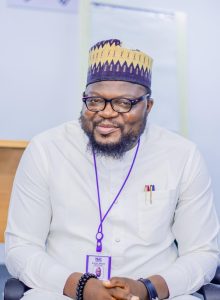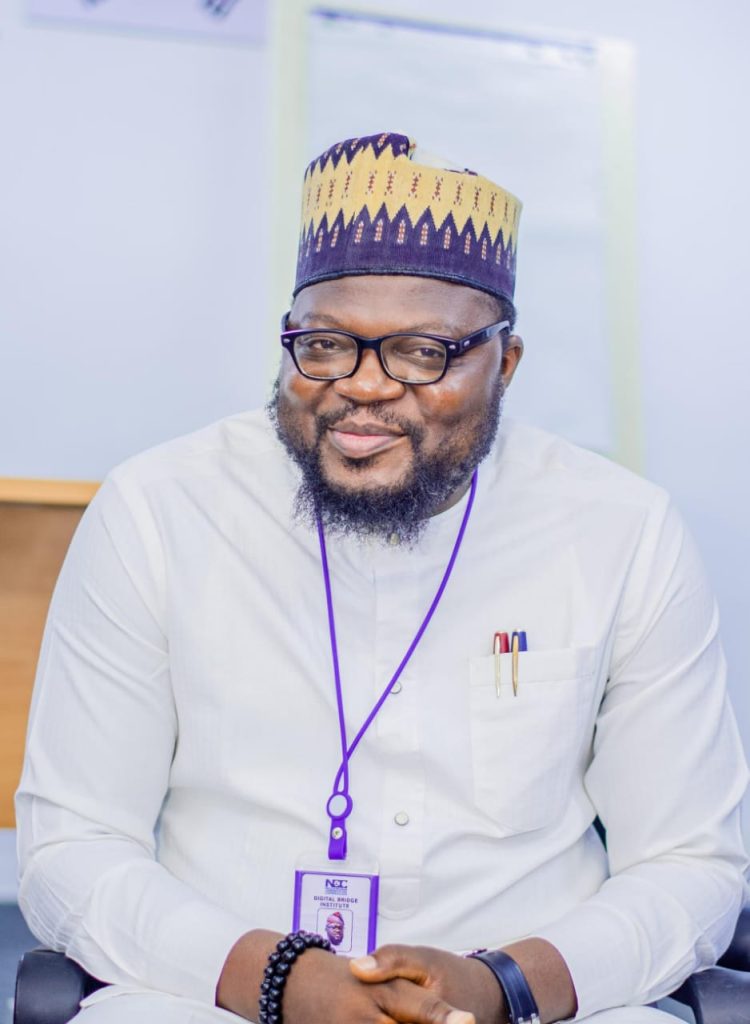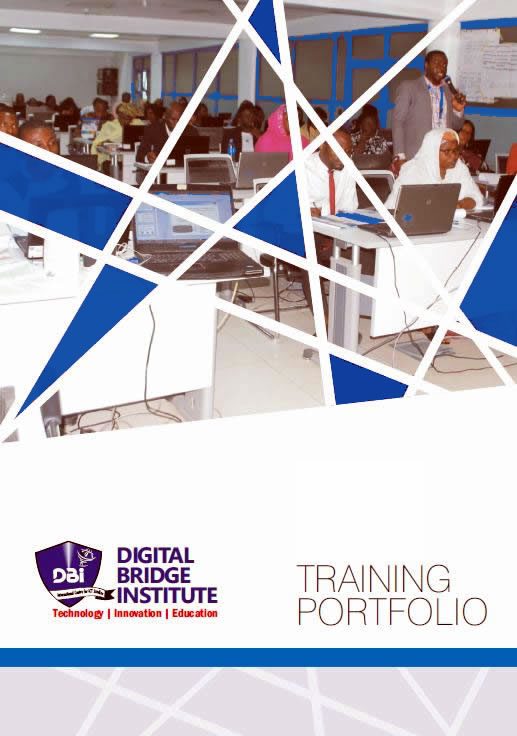 The dateline was September 2, 2024, a young brilliant soul, an ICT and digital savvy, David Daser walked briskly into the Digital Bridge Institute, DBI. His arrival was devoid of the usual fanfare of typical Nigerian political appointees, especially by the President of Nigeria. With the immediate past experience, little did the workers know that his emergence would be a turning point in the 20 years history of the foremost ICT and digital education training institute in Nigeria.
The dateline was September 2, 2024, a young brilliant soul, an ICT and digital savvy, David Daser walked briskly into the Digital Bridge Institute, DBI. His arrival was devoid of the usual fanfare of typical Nigerian political appointees, especially by the President of Nigeria. With the immediate past experience, little did the workers know that his emergence would be a turning point in the 20 years history of the foremost ICT and digital education training institute in Nigeria.
Established by the NCC in the year 2004 to build human capacity in the areas of telecommunication and Information Communication Technology (ICT), the DBI has passed through many phases, good and bad, as well as endured various challenges. Daser had been appointed by President Bola Ahmed Tinubu on 20 August, 2025, when he was announced as the President/Chief Executive Officer (CEO) of DBI. To appreciate what Daser has done within his short stay, a succinct expository of the situation in the institute shortly before his arrival, cannot be ignored, it is very imperative.
Before his appointment, a young man was appointed to take over the leadership of the institute. However, after his familiarization talks and facts-finding meetings with the management; and the realization of the enormity of the problems and challenges associated with his jobs, he left with a promise to be back. The UK-based Nigerian ostensibly considered the toxic and extremely unpleasant situation and never returned. He must have secretly but sincerely communicated his decision to walk away from the tough job to the presidency. Only a man with a heart of a lion, who can soar like an eagle even in the face of daunting challenges can take up the challenges presented by DBI at that particular moment. That is exactly what Daser represents.
Unlike the other political appointees, the big wigs, he walked in unnoticed, but within a very short time, the once relatively unknown and obscure institute became a household name. He came in when the morale of staff was at the very lowest ebb. The institute in particular was in a state of decline, while the workers were in a state of low confidence. The standing of the company, financial and structural, was extremely bad, salaries and allowances were delayed and everything seemed to be at standstill.
Coupled with this is the toxic working environment, which was not helpful. The workers were grossly unhappy, there were lopsided postings, without recourse to appropriateness of such posting as well as human and natural limitations. Accordingly, the hope of better days was not feasible, and everyone was in a state of hopelessness.
However, on this day a year ago, September 2, 2024, Daser walked in and resumed as the President/CEO of the DBI; determined to give hope to the workers. To know the truth, he defied all bureaucratic influences. Rather than adopt a usual master and servants’ style of administration, he adopted a leader and co-workers’ approach of leadership. He simply started with meetings with all cadres of the workforce. With this step, he adequately equipped himself with all that is needed to have a successful tenure. For a company that relies heavily on the general public, the governments, and the MDAs in particular in his area of businesses to lack a very crucial element of publicity, the awareness required for it to thrive and be highly successful will be limited. For many years, an institution saddled with such a huge responsibility to train the generality of people, civil servants, ICT, Telecommunication and digital professionals as well as other experts were never in the core media. Its presence in the social media was also limited.
After his familiarization talks, the first step he took was to correct the internal imbalance in terms of structure and posting of staff. He moved to put the right pegs in the right holes. He asked for staff who were improperly posted and transferred by the previous head to indicate, and there was immediate adjustment and re-adjustment. People were reposted to where they can perform optimally and be highly productive based on their qualifications and areas of disciplines. The move endeared him to the generality of the workers, and it helped in building the bond between him and all the staff. He was able to get the buy-in of the very top members of staff and the directors, who supported him and gave the needed encouragement. Viola Askia-Usoro, the most senior director; Tonia Ansa-Otubor; Ugwoke Paulinus; Ngozi Nwoche, Peace Okere and Ikwulono Sunday, all gave a mutual backing.
Daser started his core mandate by creating the long-required and desired awareness for the institute, its brand and programmes. Within his first six months, he has successfully secured and sealed a number of partnerships with both national and foreign companies. Without doubt, Daser’s experience prepared him adequately for this role. A renowned technology strategist, digital policy advocate and entrepreneur, he has served as consultant to Nigeria Police Force, and the Nigeria Air Force, where he designed and deployed critical IT solutions.
Most importantly, he was the founding Director General, Plateau State Information and Communication Technology Development Agency (PICTDA). As a political figure in Plateau where he promoted digital governance and equipped young people with future ready skills, he is not new to working with the media. He ensured that the DBI launched into the media space, and made use of the opportunities provided by both the traditional and social media, to promote the institute.
As an enterprising young professional, he delved into area where former leaders lacked in expertise. His first major event is the media publicity launch for the DBI and Small Business Training Solutions (SBTS) partnership. SBTS is one of the many partners the DBI can boast of presently. Daser has also sealed partnership with the Ministry of Humanitarian Affairs and Poverty Alleviation; The Miva Open University; The National Open University of Nigeria (NOUN); and many other public and private institutions. This signals the beginning of a new era for DBI, with the move to integrate its vocational ICT training with certification for degree and higher qualifications.
The DBI and SBTS Partnership, for instance is the most strategic partnership sealed by Daser. SBTS Group, a US based company is a foreign partner that has built world-class solutions in education, technology, and Business Process Outsourcing (BPO) across the world. According to the SBTS CEO, Mr. Evelyn Lewis, the DBI and SBTS, “are leveraging our combined expertise to create an innovative, scalable and sustainable model in Nigeria.”
The partnership is to provide globally competitive training programme; bridge the skills gap by aligning learning outcomes with employer’s needs; expand access to digital learning through modern platform, create real job opportunities by linking trained professionals with employment pipelines; and many more. This partnership will train more than 5,000 Nigerians in the next three years, and create 100,000 new digital jobs in Africa over the next five years. On June 4, 2025, the partnership unveiled massive digital infrastructures meant for the DBI campuses across the country, when the DBI-SBTS BPO centre was pre-launched.
The Nigerian-Korean INFORMATION Access Center (IAC) was commissioned at the DBI headquarters, Abuja. The Minister of Communication, Dr. Bosun Tijani commissioned the center. Daser described the center as “a bridge that connects Nigeria to the world, a bridge that links dreams to opportunities, and a bridge that unites us in our shared vision of a digitally inclusive future.” This is in line with President Bola Tinubu Renewed Hope Agenda and the 3MTT initiative of Minister of Communications and Digital Economy. His short tenure has also witnessed upgrading of DBI structures with massive facilities in all the campuses- Abuja, Lagos, Kano, Enugu, and Yola.
In recognition of his sterling performance, he has been appointed to lead many important Federal Government committees. Recently, he was appointed as Chairman, National Digital Literacy Technical Committee. This is a committee saddled with the task of achieving 95% digital literacy level in Nigeria by 2030. He was also appointed the Chairman of the Project Implementation Committee (PIC) for the Senator Oluremi Tinubu Artificial Intelligence (AI) and Robotics Centre. The PIC was established by three key institutions: The DBI, the Federal Government Technical Working Group (FGN-TwG) Projects Office, and the National Open University of Nigeria (NOUN).
The launch of DBI Talent City occurred at the DBI Lagos Campus, which is part of a national initiative to transform Nigeria into a global outsourcing hub. This program aims to convert underutilized infrastructures into digital campuses to create 500,000 jobs by 2027, ultimately fostering youth innovation, digital entrepreneurship, and employment opportunities in Nigeria’s digital economy.
Nigeria is poised to become a hub for AI innovation and training, and under his leadership, the DBI is fully committed to making this a reality. He is also ensuring that the institute is working with a renewed purpose, to bridge the digital divide and prepare a workforce ready to lead in tomorrow’s marketplace. Accordingly, he launched the DBI Global Training Partner Programme at the Lagos campus, and successfully implemented the NCC-DBI ADEPTI programme, a high impact NCC-funded training programme in Nigeria higher institutions of learning.
In a move that looks strange to some of the staff in many years, he led the DBI to celebrate its 21st anniversary on May 20, 2025, an event that celebrated the institute’s achievements and milestone as Nigeria’s foremost ICT training institute. The events witnessed exclusive gathering of esteemed partners, government officials, human resources and ICT managers as well as workers and captains of industries in the public and private sectors.
The testimonials by the generality of staff attested to his achievements, unique and friendly kind of leadership. According to Viola Askia-Usoro, the most senior staff in DBI, Dasers did something remarkable when he took over, “he hit the ground with very novel and innovative practices that moved DBI from era of dependence on one source of income and survivalist existence to situation that encourages visibility, vision, and set the agenda that we should think outside the box.” Tonia Ansa-Otudor, the Institute Secretary, said the last one year was the most wonderful period, adding, “it has been a wonderful time working with him, he has made a lot of difference, he has impacted DBI.”
Mrs Nwoche, said “David Daser didn’t arrive with ground speeches or promises, he came with clarity, purpose and hands-on approach,” while Mrs Peace Okere described him as a man of vision, whose “appointment came when the institute needed direction, which was not there as a result of the exit of the former CEO.”
To the head of Kano Campus, Mr. Sani Yakawada, “he has done so much within this one year, he met the institute in a critical situation, but I can assure you, he has done so many things right now. He made it very easy to open other revenue centers. So many leaders have attempted it but they failed, but he was able to do it.” The head of Lagos Campus, Akin Ogunlade said the last one year has been a credible one under his visionary leadership, even as he described him as a true tech politician, and a man with no impossibilities in his dictionary.
As acknowledged by the workers, Daser took over when it became a herculean task to pay staff salaries and allowances, when the facilities and office infrastructures across the campuses have deteriorated and staff morale declined significantly. The situation was stretched beyond limit with the uncertainty over the questions of identity, structure and status of DBI. With a principled and God-fearing mind like Daser, the journey back to clarity is ongoing, but steady, principled and constructive.
Soji-Ezekiel Fagbemi
Head, Public Affairs
DBI.

